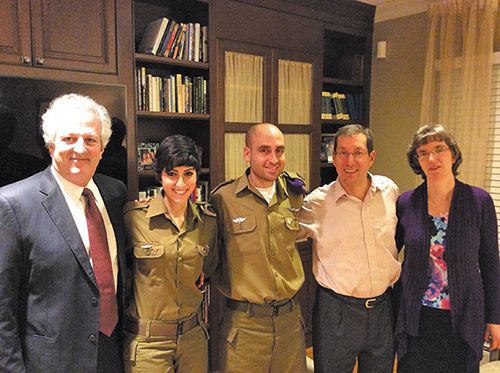

Teaneck–She’s a Paramedic and a lone soldier. “The second time we went in (to Gaza) we were under direct attack; it was quite scary.” Her name is Elle and her rank is staff sergeant with the Combat Engineering Battalion. Born and raised in Australia, Elle has been in Israel for the last three years without parents, without siblings or immediate family, relying on new friends she makes in the IDF, the relationships she builds while fighting terror, saving lives and protecting the land of Israel. “We knew for some time we were going in, we just didn’t know when. Once we did, all we knew was our next mission, not the casualties, not the deaths, only what was going on amongst ourselves; we were cutoff.”
Eliron is a non-active soldier, a reservist, and at 30 is finally at the point to pursue his education. “They can call you anytime they want. They call me every year for training and sometimes for missions, but (earlier in the summer) I received a call telling me to report immediately,” said Eliron, an IDF army captain charged with medical evacuations during Operation Protective Edge. “We had a doctor and a paramedic and our responsibility was to bring the medical team in (to Gaza) and bring them out while keeping them and us alive,” he said. “We evacuated dozens, some severely wounded, and we also evacuated Gazan citizens to Israeli hospitals for treatment.”
Both current beneficiaries of two different FIDF programs, Eliron and Elle spoke in Teaneck on Thursday October 23, 2014 at the home of Steve Mermelstein and Tamara Heimlich recounting their personal stories of courage, sacrifice and every chaylim’s genuine need for these critical programs. “The FIDF touches every soldier’s life. I encountered FIDF at many points in my life, even now as a reservist,” said Eliron, a current FIDF IMPACT! Scholarship recipient.
“I am studying Engineering and met my donor Shirley for the first time when she visited Israel. She is an amazing person. What she is giving has changed my life. Now that I am here (in the U.S.) speaking on behalf of FIDF, I had an opportunity to see her again in her Ohio community when we spoke there,” Eliron said. “We’re in touch a lot. Without her I wouldn’t be an engineer.”
Bonding is very much a part of IMPACT! The initial relationship between donor and reservist is established by the organization and ongoing communication over the four years is encouraged. “Their job is to look after Israel. Ours is to look after them.” A fitting slogan coined by the Friends of the Israeli Defense Forces (FIDF) which initiates and helps support educational, social, cultural, and recreational programs and facilities. These non-operational programs are designed in partnership with the IDF exclusively for the welfare and wellbeing of those young men and women on the front lines, patrolling the borders and defending the Jewish homeland.
Created in 1981, FIDF offers a wide array of support programs for active and non-active military members, their families, fallen soldiers and orphans. IMPACT! is a four-year scholarship higher education program for reservists; DIGNITY, provides soldiers in need with special grants for basic necessities, food allowances and holiday vouchers; LEGACY is a program biblical in its mission to “uphold the rights of the orphan and defend the cause of the widow”; plus various educational seminars and workshops devised to ease assimilation into the military, Israeli society and civilian life. Additionally, there are specific programs that supply religious items such as sefarim, sukkahs and Torah scrolls, as well as general construction projects for soldier housing; support for wounded and lone soldiers and the ADOPT-A-BRIGADE which finances construction of rooms, structures or supplies items needed for soldiers to have R&R in and around combat duty.
Howard Gases, Director of the NJ Chapter of FIDF says, “Our chapter is often referred to as the “Lone Soldier” Chapter, launched in 2005 by former lone soldiers Sammy Bar-Or, Avi Oren and Mike Gross who met while serving in the IDF Paratroopers Brigade.
Who are the lone solders? About 45% are new immigrants from Jewish communities around the world. The rest are Israeli orphans, or the disadvantaged from low socio-economic backgrounds, as well as some from ultra-Orthodox neighborhoods that are shunned by their communities and their families because they decided to go into the army.
What does it mean to be a lone solider? “There is no one to go home to, no home to bring your laundry to or family or place to celebrate Shabbat or the chaggim. You have to make friends, find your place, and thank God I have!” said Elle. Serving as the only female paramedic in her brigade, Elle finishes official duty in March 2015, but recalls her first time returning home to Australia, a trip FIDF sponsored. “It’s not a trip I can easily afford to pay for; we (soldiers) make on average around $150 a month. I remember we just hugged; I was so happy.” After 11 years without a raise, IDF soldiers recently received a unilateral 21% salary increase bringing combatant pay to approximately NIS 702 a month and in some cases a little bit more. Still, they struggle for the basics.
Risking mortal danger, delaying higher education and even marriage and having children for a number of years simply to serve, surviving and saving for school is the financial trough most discover themselves entrenched in. “FIDF is making a difference,” Gases says. “We’re asking if you can come to our dinner on November 8th, or just contribute a little, it will make a big difference.”
Celebrating its 10th Annual IDF Tribute Dinner this November 8th at the Hilton Meadowlands Hotel, FIDF is actively seeking community support. For Tickets: http://bit.ly/1yClJOu or visit their website at FIDF.org
By Elyse Hansford










